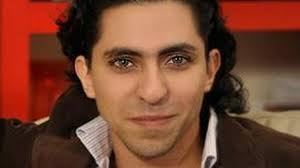
Saudi Arabia, which has described itself as the “guardian of Islam,” released a statement on Wednesday through its official news agency condemning the attack on Charlie Hebdo as a “cowardly terrorist act” that is “incompatible with Islam.” But on Friday, the government pulled a blogger named Raif Badawi from his jail cell in Jeddah, brought him to a square in front of a mosque, and administered the first phase—fifty lashes—of a public flogging. As with Charlie Hebdo, Badawi’s offense involved the exercise of freedom of expression, often with a touch of sarcasm. He is scheduled to get another fifty lashes every Friday for the next nineteen weeks. He also faces ten years in prison and a fine that exceeds a quarter of a million dollars.
Badawi, who is thirty, ran a Web site called Saudi Liberal Network, which dared to discuss the country’s rigid Islamic restrictions on culture. One post mocked the prohibition against observing Valentine’s Day, which, like all non-Muslim holidays, is banned in Saudi Arabia. (Even foreigners aren’t allowed to buy trees for Christmas.) Religious police, known as the Commission for the Promotion of Virtue and Prevention of Vice, have reportedly patrolled flower shops and chocolate shops to warn against selling items that commemorate an infidel celebration. The Web site scoffed, “Congratulations to us for the Commission on the Promotion of Virtue for teaching us virtue and for its eagerness to insure that all members of the Saudi public are among the people of paradise.”
The site was also known to criticize conservative Muslim preachers. Saudi Arabia’s brand of Wahhabi Islam is extremely fundamentalist; Osama bin Laden was an adherent, as are many members of Al Qaeda and one of its franchises, Al Qaeda in the Arabian Peninsula (A.Q.A.P.). The two shooters in Paris, Chérif and Saïd Kouachi, are said to have invoked A.Q.A.P. during their rampage. United States officials say that one of them trained in Yemen, where A.Q.A.P. has been based since it was forced out of Saudi Arabia.
Badawi’s site, which the government ordered taken down, often pressed the Saudi monarchy to show the same degree of religious tolerance that is customary in the West. In one article, which has been translated and reposted elsewhere, Badawi wrote:
We have not asked ourselves how it is that America allows Islamic missionaries on its territory, and how it is that we reject under all circumstances the freedom to proselytize within our Kingdom’s land. We can no longer hide our heads like an ostrich and say that no one can see us or that no one cares. Whether we like it or not, we, being a part of humanity, have the same duties that others have as well as the same rights.
When Badawi, a father of three, was arrested, in 2012, the charges against him included undermining Saudi security. A judge initially recommended that he be charged with apostasy, which carries an automatic death sentence. A noted Saudi cleric, Sheikh Abdul-Rahman al-Barrak, issued a religious ruling that Badawi was an “unbeliever,” because his site declared that Muslims, Jews, Christians, and atheists were equal, according to Human Rights Watch.
In 2013, when Badawi’s sentence was handed down, Nadim Houry, of Human Rights Watch, said, “This incredibly harsh sentence for a peaceful blogger makes a mockery of Saudi Arabia’s claims that it supports reform and religious dialogue.” The punishment also included an additional three months in prison for uquq, or parental disobedience, because Badawi had argued publicly with his father over the years.
After the sentencing, the French foreign ministry issued a statement expressing concern about “freedom of opinion and expression” in Saudi Arabia. On Thursday, in a rare intervention in the Saudi judiciary system, the State Department called on the Kingdom to “cancel this brutal punishment” and review both the case and the “inhumane punishment.” Jen Psaki, speaking for the State Department, said, “The United States strongly opposes laws, including apostasy laws, that restrict the exercise of these freedoms, and urges all countries to uphold these rights in practice.”
Saudi Arabia has also sentenced Badawi’s lawyer, Waleed Abu al-Khair, to fifteen years in prison—with an additional fifteen-year ban on leaving the country—for insulting the judiciary, inciting public opinion, and undermining the regime and its officials. In October, three other lawyers were sentenced to between five and eight years for criticizing the Justice Ministry. Over the past four months, the government has also detained women for driving automobiles and f0r using social media to publicly challenge the driving ban.
“These prosecutions show just how sensitive the Saudi authorities have become to the ability of ordinary citizens to voice opinions online that the government considers controversial or taboo,” Sarah Leah Whitson, of Human Rights Watch, said. “Instead of pursuing their peaceful online critics, Saudi officials would be better employed in carrying out much-needed reforms.”
